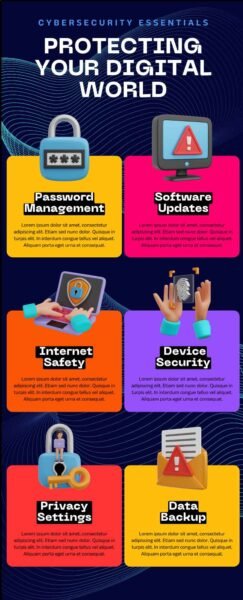Skip to the good bit
ToggleAre you worried about cyber threats affecting your small business? Many business owners assume hackers only target large corporations, but the reality is quite different. Small businesses in South Carolina face serious cybersecurity risks that can lead to financial losses, operational shutdowns, and damaged reputations.
Understanding these risks is the first step toward protecting your business. Here are ten crucial cybersecurity facts every small business in South Carolina should know.
1. Cyberattacks Can Cause Major Financial Losses
Cybercrime costs businesses billions of dollars each year. For small businesses, even a minor cyberattack can result in significant financial losses. Hackers can drain bank accounts, steal credit card details, or demand ransom payments. Additionally, businesses may face legal costs, regulatory fines, and lost revenue due to downtime.
A single security breach can be devastating. Customers may lose trust in a business that has been hacked, leading to a decline in sales. Many businesses also spend thousands of dollars to recover lost data, improve security, and handle public relations after an attack. The financial burden can be overwhelming, especially for businesses operating on tight budgets.
2. Small Businesses Are Prime Targets
Are you worried about cyber threats affecting your small business? Many business owners assume hackers only target large corporations, but that’s far from the truth. In fact, small businesses are prime targets for cybercriminals because they often have fewer defenses, outdated systems, and limited IT support. These vulnerabilities make them easy marks for attacks that can cripple operations.
In places like Myrtle Beach, where tourism drives many businesses, digital transactions are common. This reliance on online systems increases the risk of data breaches. Without strong cybersecurity, sensitive customer information can be exposed.
Cyberattacks on small businesses have been increasing every year. Without strong cyber security, hackers can steal data or install malware. Many businesses rely on local Myrtle Beach’s IT support to improve cybersecurity and prevent costly attacks. A single breach can damage trust and hurt profits.
3. Ransomware Attacks Are Increasing
Ransomware stands as the most dangerous threat that presents risks to small businesses. The malware attacks by locking business data prevents users from accessing their files until a ransom payment is made. Small businesses fall into hackers’ attack sights primarily because the hackers think these businesses will choose to pay rather than face data loss risks.
An attack with ransomware has the power to fully shut down all business operations. Companies that skip data backup procedures may have to pay ransom demands to expect that their files might be restored by the attackers. Paying the ransom doesn’t guarantee you’ll get your data back.
4. Phishing Attacks Can Trick Employees
Businesses experience repeated intrusion of their systems through phishing email campaigns from hackers. Hackers generate deceptive email messages that seem to originate from different genuine entities including banks and business executives and supplier organizations. Workers become victims to infiltrating criminals when they fall for attacks that involve malicious links and expose sensitive information.
Criminals use increasingly advanced tactics each day during phishing attacks. The hackers produce authentic-looking fake websites along with professional-looking fake emails to deceive their targets. Untrained workers can surrender passwords as well as customer data alongside financial information without being aware of the consequences.
5. Weak Passwords Can Lead to Data Breaches
The reason behind most cyberattacks rests in businesses opting for simple passwords which hackers can easily predict. Automated tools built for hacking enable attackers to crack into accounts by executing their systems through thousands of password options. A hacker can access company information within seconds when an employee adopts a basic password choice such as “123456” or “password.”
Using strong passwords is essential. Businesses should require employees to use complex passwords that include letters, numbers, and special characters. Passwords should also be changed regularly. Implementing two-factor authentication adds an extra layer of security, making it harder for hackers to break into business accounts.
6. Outdated Software Increases Vulnerability
Many small businesses use outdated software, not realizing it makes them more vulnerable to cyberattacks. Hackers look for security weaknesses in old software and exploit them. If a business does not update its operating system, web browser, or security software, it becomes an easy target.
Software updates often include security patches that fix vulnerabilities. Businesses that ignore updates leave their systems exposed. Cybercriminals constantly develop new hacking methods, and businesses must stay ahead by keeping their software up to date.
7. Data Breaches Can Damage a Business’s Reputation
A cyberattack can do more than just steal money—it can destroy a business’s reputation. Customers trust businesses with their personal information, and a data breach can shatter that trust. If customers feel their data is not safe, they may take their business elsewhere.
Recovering from a security breach takes time and effort. Businesses must notify affected customers, repair security flaws, and rebuild trust. Some customers may never return, and negative publicity can make it difficult to attract new clients. Protecting customer data should be a top priority for every small business.
8. Employee Training Is Essential for Cybersecurity
Many cyberattacks succeed because employees make mistakes. An employee may click on a suspicious email, download an infected file, or use a weak password. Hackers rely on human error to gain access to business systems.
Training employees in cybersecurity can prevent many attacks. Businesses should teach employees how to recognize phishing emails, create strong passwords, and follow security policies. Regular training sessions keep cybersecurity fresh in employees’ minds and reduce the chances of costly mistakes.
9. Cyber Insurance Can Help Cover Losses
Even with strong security measures, cyberattacks can still happen. Cyber insurance can help businesses recover from financial losses caused by data breaches, ransomware attacks, and other cyber threats. This type of insurance can cover the cost of data recovery, legal fees, and even customer notification expenses.
Cyber insurance is becoming more popular among small businesses. It provides an extra layer of protection in case of an attack. However, businesses should not rely solely on insurance. Preventing cyberattacks through strong security measures is always the best approach.
10. Proactive Security Measures Can Prevent Attacks

Small businesses must take cyber security seriously and implement proactive measures. Installing firewalls, using antivirus software, and encrypting sensitive data can help prevent cyberattacks. Regular security audits can identify weaknesses before hackers exploit them.
Backing up data regularly is another important step. Businesses should store backups in a secure location and test them frequently. If a cyberattack occurs, having a backup can prevent major disruptions.
Conclusion
Cybersecurity is no longer just a concern for large corporations. Small businesses in South Carolina are at risk and must take steps to protect themselves. Hackers are constantly looking for new ways to exploit weaknesses, and businesses that do not prioritize security may pay a heavy price.
Understanding these ten cybersecurity facts is the first step toward protecting your business. By training employees, using strong passwords, updating software, and investing in security measures, small businesses can reduce their risk of cyberattacks. The digital world is full of threats, but with the right precautions, your business can stay safe and secure.
FAQs
- How can small businesses detect a cyberattack early?
Businesses should watch for unusual system activity, unexpected password changes, slow network performance, and unauthorized access attempts. Regular security audits and monitoring software can help detect threats before they cause major damage.
- What should a small business do immediately after a cyberattack?
Businesses should disconnect affected systems, notify their IT team or cybersecurity provider, change passwords, and report the attack to the relevant authorities. Acting quickly can help contain the damage and prevent further breaches.
- Are mobile devices a cybersecurity risk for small businesses?
Yes, mobile devices can be a weak point if not properly secured. Businesses should require strong passwords, enable encryption, and use mobile device management (MDM) solutions to protect company data from cyber threats.







